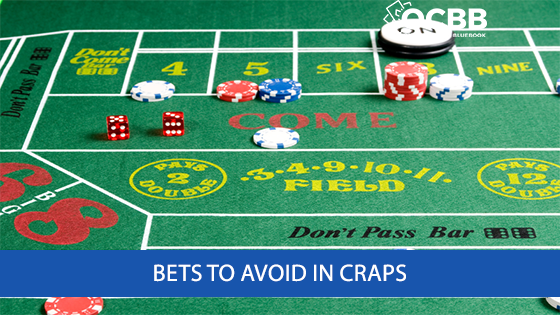Bets To Avoid In Craps
Are you looking to try your luck at craps? Before throwing those dice, it’s crucial you understand the basics of craps and the bets that can trip up even seasoned players. This guide will dissect the allure and pitfalls of proposition bets, Big 6 and Big 8, hardways, and the field bet. Let’s help you navigate these tricky waters, boosting your gameplay while minimizing losses. Ready to roll smarter, not harder? Let’s dive in!
Key Takeaways
- Minimizing the house edge improves odds
- Proposition bets offer high risk and high payouts
- Big 6 and Big 8 bets have a high house edge of 9.09%
- The field bet may seem favorable but has hidden risks
 Understanding the House Edge
Understanding the House Edge
You’ve got to understand the house edge if you want to improve your odds in craps. The house edge is a craps term used in casinos to indicate the mathematical advantage that the gambling game, and therefore the casino, has over you as you play over time. This advantage results in an assured percentage return to the casino over time and gives you a losing expectation.
The key here is the edge calculation. In essence, it’s determining how much of an advantage the house holds on any given bet. Your betting strategy should revolve around minimizing this edge as much as possible while maximizing your potential winnings.
The tricky part about craps is that different bets have vastly different house advantages. You need to hone your odds understanding by learning which bets carry a lower house edge and which ones are simply sucker bets meant to drain your chip stack. For example, pass line or come bets with odds are some of your best options since they decrease the overall house advantage against you.
Remember, knowledge is power – especially at the dice table. By mastering these concepts, you can make more informed wagering decisions and significantly enhance your chances of success in craps.
The Allure of Proposition Bets
Despite their tempting payouts, proposition wagers can be a risky choice in dice games. The psychology behind these bets is intriguing; they offer a high risk allure that promises substantial rewards. But don’t get fooled by the quick win illusion.
Proposition bet psychology plays on your desire for immediate gratification. These are single-roll bets with hefty odds, and the possibility of a large payout can seem irresistible. You might think, “Why not take a chance?” Yet, you need to remember that the house edge on proposition bets is much higher than other options.
The high risk allure of proposition bets stems from their misleading payouts. Sure, they offer bigger potential prizes but don’t forget – you’re more likely to lose these bets than win them. They’re designed in such a way that winning seems attainable and losing seems unlikely – which isn’t the case at all.
A thorough understanding of craps requires recognizing these traps and making smarter decisions about where to place your money. So next time you’re tempted by those large numbers flashing on proposition wagers, consider whether it’s worth the increased risk involved.
The Pitfalls of Big 6 and Big 8
It’s crucial to understand the pitfalls of Big 6 and Big 8 in dice games, as they can be just as misleading as proposition wagers. When you’re caught up in the excitement of the game, it’s easy to fall victim to Big 6 misconceptions. You might think that these bets offer an advantage considering their simplicity – after all, you only need a roll of 6 or 8 before a roll of 7 appears.
However, closer bet analysis reveals a different story. The house edge on these bets is surprisingly high—9.09%. That means for every dollar you wager, you’ll lose about nine cents on average over time. This is significantly worse than most other craps bets.
In terms of game strategies, your best move is to opt for pass line or don’t pass line with odds instead. These have much lower house edges and offer safer gameplay compared to risky returns promised by the Big 6 and Big 8.
Remember this advice next time you’re at the table: Avoid getting lured into making these bets merely because they seem straightforward or tempting due to possible quick wins. Your bankroll will thank you for it later!
The Danger of Hardways
Another trap you need to be wary of in dice games is the danger of Hardways. This particular bet considers the outcome where you roll a pair (two 2s, two 3s, two 4s or two 5s) before throwing a seven or any other combination that adds up to that number. It sounds enticing and simple enough but don’t let its charm fool you; it’s among the treacherous waters where many novice players capsize.
The Hardways strategy may seem like an exciting play when you’re on a hot streak, but the betting risks are substantial. You see, dice probabilities aren’t in your favor with these bets. The chances of rolling a hard six or eight is only one in ten while hard four and ten come up even less frequently with odds standing at one in twelve.
In addition to unfavorable odds, the Hardways payout isn’t as generous as it might appear at first glance. For instance, hard six and eight pay out at just nine to one while hard four and ten offer seven to one odds – far from compensating for the high risk involved.
So next time you find yourself reaching for those snake eyes think twice! There’s more profit potential by avoiding such perilous plays.
The Deception of the Field Bet
It may seem enticing due to its simplicity, but don’t let that mask the hidden risks involved. The field bet’s odds may appear favorable at first glance because it covers more numbers on the table. However, this surface-level appearance belies a deeper statistical disadvantage.
Understanding the bet’s probability is key to recognizing these hidden risks. You’re betting that one roll of the dice will land on 2, 3, 4, 9, 10, 11 or 12. While these are seven out of twelve possible outcomes (giving an illusion of better than half chance), only sixteen out of thirty-six possible combinations actually result in a win. That means your true odds are closer to forty-four percent – significantly lower than fifty percent.
Strategic avoidance is crucial when it comes to navigating potential pitfalls in craps like the field bet. When you understand how deceptive its odds are and recognize its unfavorable probability distribution, you can make more informed decisions at the table and increase your chances for success over time. So keep your chips off this risky wager and focus on bets with better odds instead.
Conclusion
So, you’ve learned about the traps of craps: proposition bets, Big 6 and Big 8, Hardways, and the Field Bet. Remember, these are designed to favor the house more than you. Don’t be dazzled by their allure; stick to smart betting strategies. With this in mind, your chances at the table will significantly improve. So go on out there and play wisely!
Frequently Asked Questions
What is the basic strategy to start playing for beginners?
Start by understanding craps terminology and the table layout. Master dice throwing techniques, focusing on control and consistency. Learn to calculate your odds as a player, helping you make informed betting decisions.
Are there any specific superstitions associated with the game?
Yes, craps superstitions originate from various cultures. Players often carry lucky charms and perform rituals before rolling the dice, stemming from superstition psychology that believes in influencing the game’s outcome with these actions.
How can I manage my bankroll effectively while playing?
To manage your bankroll effectively in craps, consider bankroll diversification, setting loss limits and profit goals. Adjust bets based on game progress. This strategic approach ensures balanced play and smarter financial decisions.
Can I play online and is it different from playing in a physical casino?
Yes, you can play craps online. Online advantages include playing at your own pace and software reliability. However, internet connectivity issues may occur. Live dealer experiences are also different but still enjoyable.
Are there any specific etiquettes or rules I should be aware of while playing in a casino?
Absolutely. Handle the dice with one hand, don’t hit dealer’s stacks when throwing. Interact respectfully with dealers and players. Follow table manners, place bets only in between rolls to avoid disrupting betting timing.



